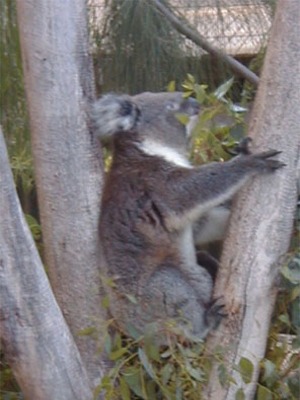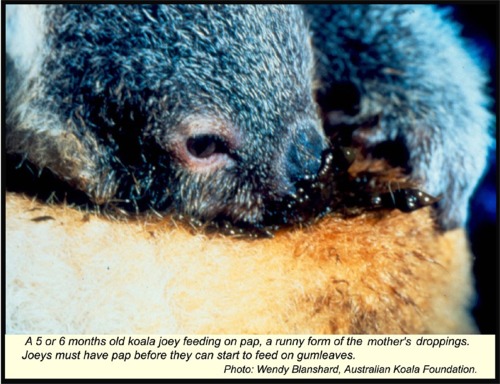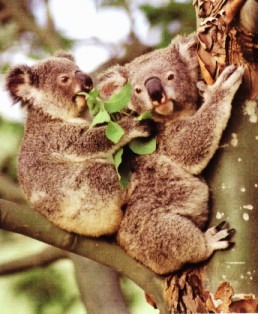| Let's eat! What's for dinner? Diet
The koala is a very picky eater. Its diet
consists primarily of eucalypts leaves, although the animal is known
to occasionally eat buds, fruit, or bark. Even though the
koala's diet consists mostly of eucalypts leaves, the animal is
still picky in which types of eucalypts leaves it will eat.
The koala is the only mammal known to eucalypts because the leaves
contain toxins.

Also, the eucalypts leaves are hard to digest and provide very
little nutrition to the animal. This causes the koala to sleep
18-22 hours a day to conserve the little energy that is obtained
from the leaves. The adult koala eats around 1 pound of leaves
each day. The female koalas must consume more leaves when they
are lactating to maintain higher energy levels (Krockenberger).
Baby koalas, called joeys, drink milk from their mother when they
are first born. The joeys drink the milk until they are about
6 months old. At that point, the mother koala starts to
produce a substance called pap, a specialized runny form of feces
that distributes important digestive enzymes to the joey.

After eating pap for a while, the joey will be able to shift to a
diet of eucalypts leaves like the adults.

Digestion
The koala's digestive system is adapted to its unique diet.
The digestive system can detoxify the poisons found in the eucalypts
leaves. The koalas have a special structure, called a caecum,
where digestion of fiber takes place. Other mammals have
caecums, but the caecum of the koala is enlarged to better absorb
the fiber obtained through the diet. Since the koala cannot
directly digest the fiber, there are millions of bacteria living in
their digestive tract to break it down for them, making it easier to
absorb the nutrients. Koalas can also absorb a great deal of
water from the eucalypts leaves, allowing for them to drink water
only in times of drought.

How does it eat?
Teeth
The teeth of the koala are adapted to its diet, as well.
The koala, like the human, has four types of teeth: incisors,
canines, premolars, and molars. The number, arrangement, and
shape of the teeth differ from humans, however. The incisors
are used to manipulate the branch as the koala eats. The sharp
premolars are used to rip the leaves off of the tree. The
leaves are then transported by the tongue to a large gap called the
diastema. From the diastema, the leaves are moved to the
molars, where mastication takes place.
It is worth mentioning that koalas experience a great deal of
tooth wear as they age. This is caused by the abrasive fiber
that the eucalypts leaves contain. Older animals must
therefore eat more to get the same nutrition. By eating more,
the animals are able to get a normal amount of finer particles that
are necessary for digestion. This is such a common phenomenon
that at one point, scientists measured the age of a koala based on
their amount of tooth wear. More recently, studies have shown
that as tooth wear increases, koalas exhibit rumination-like
behaviors (Logan). The rumination allows for the animal to
consume the larger particles, regurgitate, remasticate and reswallow
the particles. Only the fine particles can pass through the
rumen into the rest of digestive system.

|